Loneliness is more than just a feeling; it can have serious effects on both your brain and body. Research shows that loneliness can increase your risk of heart disease by 29% and stroke by 32%. These numbers are significant and should not be ignored. Let’s explore how loneliness impacts your health.
Loneliness and Stress
Feeling lonely is complicated. When you lack meaningful social connections, your body becomes aware of your solitude. As a result, your stress response kicks in.
- Your sympathetic nervous system goes into overdrive, which can lead to increased feelings of paranoia and suspicion toward others.
- At the same time, the areas of your brain responsible for love and connection become less active.
The Paradox of Loneliness
This leads to a vicious cycle known as the paradox of loneliness. Loneliness drives you to withdraw from social interactions, making it harder to seek out the very connections that could alleviate your feelings of isolation.
Hormonal Changes and Brain Chemistry
Loneliness affects hormone levels in several ways:
- Cortisol, a hormone associated with stress, can become unbalanced.
- Dopamine, the feel-good hormone, may increase, leading you to seek quick rewards, such as drinking or gambling, without considering the consequences.
- Levels of serotonin, oxytocin, and your body’s natural pain relievers drop. These chemicals usually surge when you share a meal with friends or experience moments of joy.
As a result, loneliness creates a cascading effect on your physical health.
Short-Term Effects of Loneliness
In the short term, loneliness can lead to:
- Increased anxiety and stress
- Withdrawal from social activities
- General feelings of fatigue
- Heightened anxiety and paranoia
Long-Term Effects of Loneliness
Over time, loneliness can lead to:
- Increased susceptibility to illnesses like the flu or COVID-19
- Chronic pain and fatigue
- Poor sleep quality, leaving you feeling unrested
- Cognitive decline, impacting memory and potentially leading to dementia
Moreover, increased inflammation from loneliness significantly affects heart health. Heart disease remains the leading cause of death in the USA, and loneliness can also reduce life expectancy. In fact, its impact on your health can be comparable to smoking, the number one preventable cause of death.
Combating Loneliness
The good news is that you can combat the negative effects of loneliness. Evidence suggests that connecting with others, even in small ways, can shift the balance toward better physical and emotional health. Here are some strategies to consider:
- Reach Out: Hearing a loved one’s voice can positively impact your brain and nervous system.
- Art Therapy: Engaging in creative activities can be beneficial. Many rehabilitation centers now include art therapy as a core component.
- Nature Connection: Simply spending time outdoors can enhance your well-being.
- Physical Activity: Exercise and social interaction can help alleviate feelings of loneliness.
- Seek Meaningful Connections: Focus on building relationships that resonate with you deeply rather than just surrounding yourself with people.
Ultimately, the goal is not to fill your life with acquaintances but to form connections that truly fulfill you.
A Word of Hope
Understanding what makes you happy is key. Loneliness is a common experience, but it doesn’t have to define you. By making small efforts to connect with others, you can improve your health and well-being.
For more insights into health and wellness, visit the medicaltimes.io website.
References:
- American Psychological Association (APA)
- Centers for Disease Control and Prevention (CDC)
- National Institute on Aging
